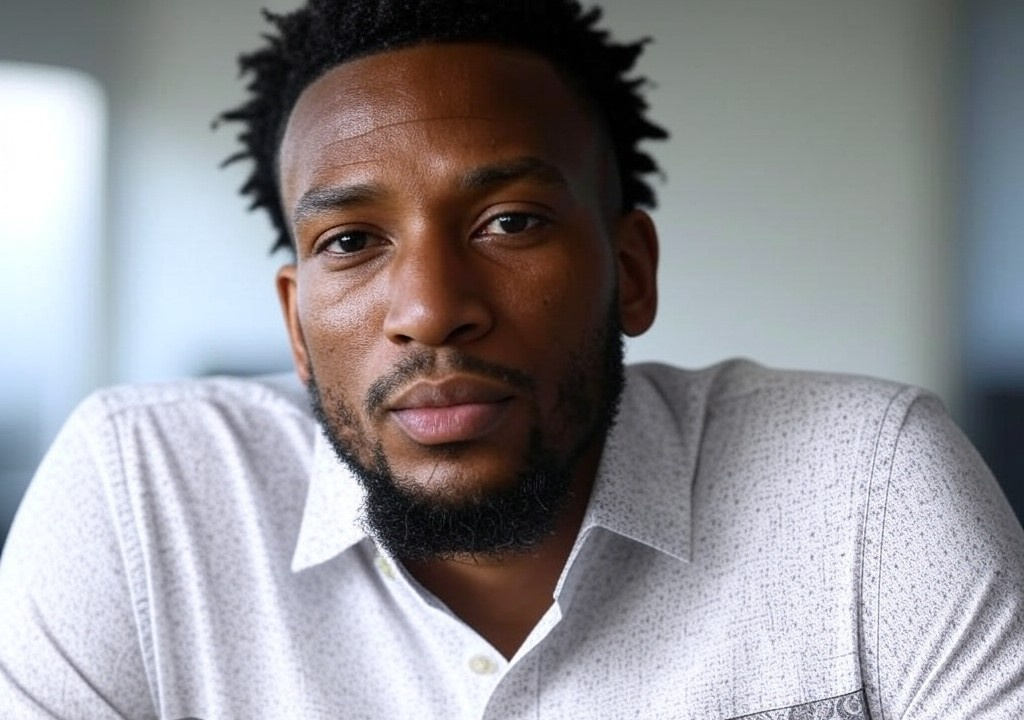The Fight with Myself I Didn't See Coming
Let me set the scene for you. It’s Chicago, mid-January—gray skies, wind so sharp it feels personal, and snow piled on the corners like that one flaky coworker who always says they'll pitch in but never does. I’m walking into the 79th Street post office to mail a package. Nothing special, right? Except I’m sweating bullets because this package contains a journal—the journal—of every messy, complicated feeling I’ve had over the past six months. And no, it’s not for some poetry contest. It’s for therapy. Yes, for my therapist. The same therapist I’d been lying to for months by saying, “Oh yeah, things are fine.”
Why? Because even when we know better, being vulnerable is hard. And I was losing the battle between the me who wanted to act unbothered and the me who desperately needed to let someone in. Spoiler: the unbothered version was winning…until that day.
Section 1: The Weight of the “I’m Good” Mask
Before I get into how I won this secret battle, let’s talk about how it started. My life, on paper, was in a sweet spot. My first novel had dropped to solid reviews. My parents were healthy and still calling me up to see if I needed anything (“Did you eat today? Do you have enough toilet paper?” South Side parents will always parent). Even love was in the mix—sort of. I’d been seeing someone who made rainy afternoons feel cinematic and made me laugh in ways that felt almost medicinal.
And yet, every night I had the same sinking feeling. Like I’d set out all the pieces of the puzzle that was my life but no matter how I tried, they didn’t quite fit. That’s the thing about emotional battles—they don’t announce themselves with trumpets and banners. They creep in when you’ve convinced yourself you have no reason to be unhappy.
For me, the weight of my internal struggle showed up in weird ways. I started snapping at my partner over dumb stuff, like the “right” way to load the dishwasher (for the record, knives point down—it’s the law). Or I’d sit down to write and my screen stayed blank, the cursor taunting me like, “You good? You sure about that?”
What’s wild is, instead of addressing my feelings, I tried to out-hustle them. Chicagoans know this energy well. You grind. You push. You fill your schedule until it feels like there’s no room for self-doubt. But you can’t outrun things forever, because eventually, your brain will hold up a stop sign you can’t ignore.
Section 2: How Real Change Started (Once I Got Out of My Own Way)
Now, let me tell you something that’s not charming: ghosting your therapist—not strategically canceling here and there, but straight-up lying like, “Oh, sorry, I’ve been slammed these past four weeks.” Meanwhile, I was home binge-watching Girlfriends like Joan Clayton was gonna appear and fix my life.
Finally, during one session where she must’ve sensed my latest excuse was about as solid as a soggy Chicago pothole, she said something that snapped me into focus: “You spent your whole life learning how to survive, DeAndre, but surviving isn’t the same as thriving. Are you okay with staying here forever?”
Whew.
She gave me an assignment: Start journaling. Not the cool, “manifestation journaling” TikTok loves, but grit-laden honesty. I wasn’t enthused—this wasn’t exactly the South Side glow-up story I wanted to write for myself. But I did it anyway because, frankly, lying to your therapist gets exhausting.
And let me tell you, putting all those feelings down on paper? First, it was awkward—I felt like I was writing a mixtape for no one. But then, I started realizing how much I’d been holding in. Like the resentment I didn’t know I felt about my partner always “fixing” my problems when all I wanted was for them to listen. Or my fear that if I slowed down my work for even a second, people would stop taking me seriously. Writing it down gave me room to look at these thoughts, pick them up, and ask: What’s this really about? That’s the difference vulnerability makes—it shifts things from undefined chaos to something you can work with.
Section 3: What I Learned About Love & Vulnerability
Alright, let’s bring this back to relationships because, let’s be real: half of our emotional work comes from trying to navigate the beautiful chaos that is human connection.
Here’s the hard truth: If you’re fighting secret battles with yourself, it’s going to sneak into your relationships. My need to project confidence—this front like, “Yeah, I’ve got it together 24/7”—created distance with my partner. And it wasn’t their fault. They were doing their best, but let’s admit it, reading someone’s vibes isn’t the same as understanding their heart. How could they show up for me if I didn’t even show up for myself?
Vulnerability doesn’t mean running into the streets with a “Help Me, I’m Struggling” sign. It’s the quiet bravery of saying: “This is how I’m really feeling.” Or: “I need you to just sit with me while I figure this out.” My partner wasn’t asking me to have all the answers; they just wanted the invitation to sit in my corner.
Here’s what’s wild: The more honest I became, the more my relationship relaxed. Suddenly, we weren’t nitpicking each other about things that didn’t mean anything (RIP to the dishwasher drama). And just like that, we found the space to enjoy each other fully without the ghost of my unspoken feelings crashing the party.
Section 4: Tips for Fighting Your Own Secret Battles
Look, maybe you don’t have a therapist calling you out, but here’s what I picked up from this season of life. If you’re feeling stuck in a secret struggle, here are some starting points:
- Name What You’re Feeling: Take a few minutes to actually name what’s going on. Write it, voice-record it, whisper it in your kitchen—whatever works. Naming it strips a little of its power.
- Invest in Support Systems: Therapy is a game-changer. So are good friends who won’t judge you for calling them just to vent.
- Use "I Feel" Statements in Relationships: Instead of getting defensive or shutting down in arguments, say, “I feel [X emotion], and I don’t know what to do about it yet.” It opens up conversations and builds trust.
- Lose the Hustle Hero Complex: Productivity is great, but using work to bury feelings is like sweeping dirt under a rug. The mess will trip you up eventually.
Thriving Beyond Survival
That day in the post office, when I stood in line clutching that package for my therapist like it was a literal bomb? It felt like the breaking point of my six-month war with myself. But guess what? That act of releasing my thoughts onto those pages and sending them off was how I started winning.
There’s this quote Gwendolyn Brooks said that stays with me: “Live not for battles won. Live not for the-end-of-the-song. Live in the along.” Too often I’ve been obsessed with reaching fixed, shiny outcomes. But the real magic—the real joy—is in showing up in the messy, everyday "along."
Whether it’s love, writing, or sorting through our heads, we’ll all have battles we fight quietly. The trick isn’t looking unscathed; it’s learning how to care for your wounds in healthy ways. Trust me, that’s where thriving begins. Keep going—you’ve got this.




















